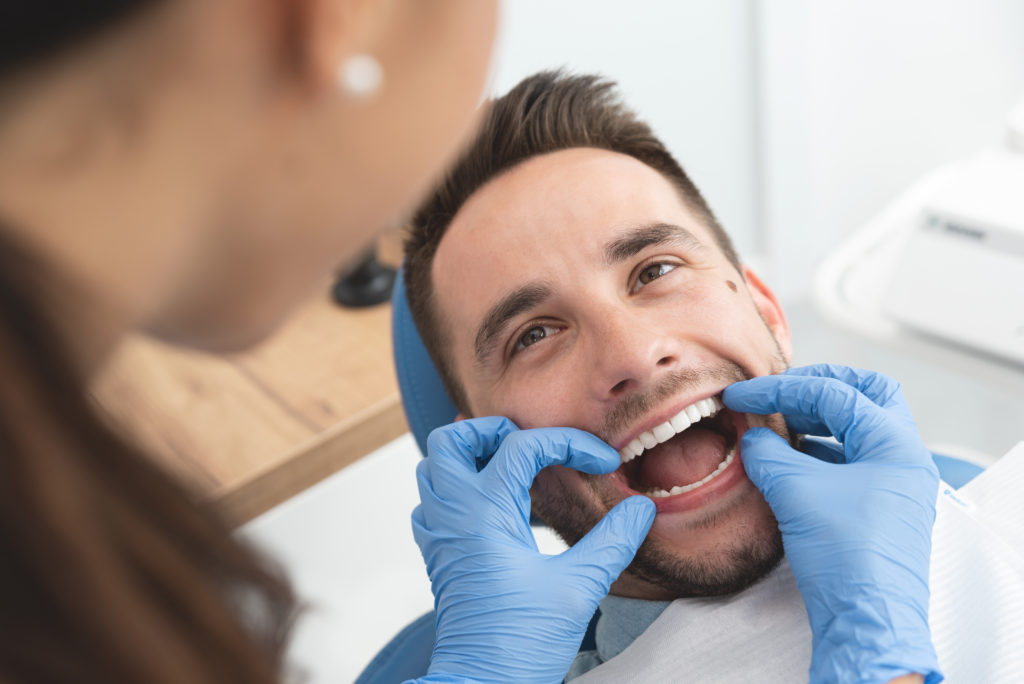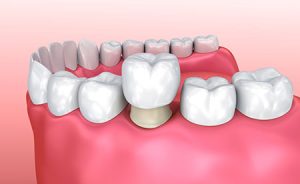
If one or more of your teeth have weakened or broken down due to decay or wear and tear over time, dental crowns may be the best solution to restore your smile’s resilience.
As an experienced and trusted dentist in Mission Viejo, Dr. Robert Milner’s primary goal is to help create a strong, healthy smile for all his patients and help them maintain it for as long as possible. Dental crowns are an excellent option for patients who seek to restore function and/or the appearance of a tooth.
What is a Dental Crown?
A dental crown is a cap made of a durable material placed over your tooth in order to restore full function and normal appearance to a compromised tooth. Crafted from high-quality materials, crowns are color-matched and shaped to look like natural teeth. When placed, they are practically indistinguishable from the surrounding teeth. There are several choices for dental crowns, and Dr. Milner will help you select the type that is most suitable for your needs and goals.
Do I Need Dental Crowns?
Dr. Milner uses dental crowns on patients in need of restorative or cosmetic dental treatment. The resilient composites can be used to treat the following dental concerns:
- Broken, damaged teeth caused by stress fractures or cracks
- Misshapen tooth or teeth
- Teeth that have become brittle or weakened from a root canal
- Teeth that have weakened from having mercury fillings
- To cover a dental implant or attach a bridge
Dental Crown Treatment Process
The crown placement process is performed over two visits to our dental office. During the first visit, Dr. Milner will prepare your tooth to ensure the proper fit for the crown. He will apply a topical numbing substance to numb the treatment area. Next, Dr. Milner will reduce the size of your tooth and then make an impression of your tooth or teeth where the crown will reside. This mold is then sent out to our dental laboratory to create your permanent crown. A temporary crown will be placed until your permanent one is ready.
Once your crown is ready, we will notify you and schedule an appointment for you to return to our office. During your second appointment, Dr. Milner will remove your temporary crown and place the permanent crown in its place. We will then put the final touches on your crown by checking for a proper fit. Once it is ready, the crown will be bonded to your teeth using dental cement.

Caring for Your Dental Crown
Dental crowns are strong and durable, and with proper care, can last for many years. Good oral hygiene is imperative in preserving the beauty and health of your dental crown. Dr. Milner also recommends avoiding biting down on hard foods and objects. Tooth grinding and clenching should also be avoided. Regular dental visits will allow us to assess the health of your crown and overall dental health.
Benefits of Dental Crowns

Dental crowns offer numerous benefits, making them a popular choice for patients looking to restore their smiles:
- Aesthetic Improvement: Crowns are custom-made to match the shape, color, and size of your surrounding teeth, providing a natural and aesthetically pleasing appearance.
- Durability: Made from materials like porcelain, ceramic, or metal alloys, dental crowns are designed to withstand the rigors of daily chewing and biting, offering a long-term solution for damaged teeth.
- Protection: Crowns serve as a protective cap for damaged or weakened teeth, safeguarding them against further decay, wear, and tear.
- Functionality: By restoring the shape and size of your teeth, dental crowns improve your ability to chew and speak properly.
Recovery After Dental Crown Procedure
After the placement of your dental crown, it is normal to experience some sensitivity and mild discomfort, which typically subsides within a few days. Dr. Milner and his team ensure that the process is as comfortable and seamless as possible, offering detailed post-procedure instructions to aid in your recovery. Here’s what you can expect:
- Immediate Aftercare: It’s advisable to avoid hot, cold, or very chewy foods until the anesthesia wears off to prevent any inadvertent injury to your mouth.
- Sensitivity: Your newly crowned tooth may be sensitive to temperature changes and pressure for a few days. Over-the-counter pain relievers can help manage any discomfort.
- Oral Hygiene: Continue with your regular oral hygiene routine, including brushing and flossing. However, be gentle around the crowned tooth to avoid dislodging it before the cement has fully set.
Frequently Asked Questions about Dental Crowns
What are crowns made of?
Crowns can be made from a few different types of materials. Older crowns were made from metals like gold alloy. Nowadays, most crowns are crafted from porcelain-fused-to-metal, all-resin, all-ceramic or all-porcelain crowns. These types of crowns have become popular as they look like natural teeth. Most people can’t tell the difference between a porcelain or ceramic crown and a natural, healthy tooth.
Will I need to wear a temporary crown?
Yes, you will need to wear a temporary crown while you wait for your permanent crown. Since some tooth structure is removed to make room for the crown, it will need to be covered by a permanent crown.
Will I feel pain when getting a crown?
No. We will use a local anesthetic to completely numb the tooth receiving the crown. You should not feel any pain or discomfort during the treatment. As the numbing medication wears off, your mouth may feel a bit sore, and you can take over-the-counter pain medication if you experience any discomfort.
Can I eat after getting my crown?
You can resume eating when the numbing medication has worn off. You should avoid eating anything hard or sticky, as it could damage the crown.
Can I brush and floss a crown?
Yes, proper hygiene is critical to preserving your crown and prolonging its lifespan. You should brush and floss your crown just like you would a natural tooth. Be sure to see your dentist at least every six months so they can check the integrity of your crown.
How long does it take to get used to a new crown?

Most patients adjust to their new dental crown within a few days to a week. Initially, the crowned tooth may feel a bit strange or sensitive, but this sensation should diminish as you become accustomed to the crown. If you experience prolonged discomfort or the crown affects your bite, Dr. Milner can make necessary adjustments.
Can I replace an old crown with a new one?
Yes, old dental crowns can be replaced with new ones. Crowns may need to be replaced due to wear, damage, or aesthetic concerns. Dr. Milner will evaluate the condition of your existing crown and underlying tooth to determine if a replacement is necessary and discuss your options for a new, custom-fitted crown.
Can dental crowns be whitened after they are placed?
No, dental crowns cannot be whitened once they are placed. Crowns are made from materials that do not respond to whitening agents like natural tooth enamel does. If you are considering whitening your teeth, it is recommended to do so before getting a dental crown, allowing Dr. Milner to match the crown to your new tooth color for a seamless look.
Will I need a crown after a root canal?
In many cases, a dental crown is recommended after a root canal treatment, especially if the tooth is in the back of the mouth where the chewing force is greater. The root canal procedure involves removing the infected or damaged pulp inside your tooth, which can leave the tooth brittle and susceptible to fractures. A crown provides the necessary protection to the tooth, restoring its strength, functionality, and appearance. Dr. Milner will evaluate your specific situation to determine if a crown is necessary after your root canal.
Schedule A Dental Crown Consultation Today
To learn more about dental crowns, please schedule a consultation at Dr. Milner’s Mission Viejo dental practice. Please call us at 949-859-8899.




